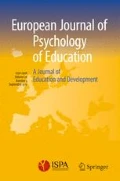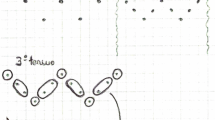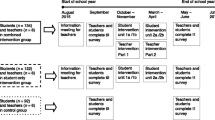Abstract
After the effectiveness of self-regulation training outside school was demonstrated, a self-regulation intervention was developed to foster the learning achievement in regular math classes. Based on the theoretical framework of self-regulated learning, self-regulation training was integrated into a math class unit. The evaluation of the intervention concerning 53 sixth-grade students took place in a pretest/posttest-control-group design. One teacher taught one class (control group) merely mathematical topics and another class (experimental group) in the same subject combined with self-regulative strategies. The results revealed that it is possible to support self-regulation competencies and mathematical achievement by self-regulation interventin within regular mathematics lessons of 6th-grade students.
Résumé
Envisageant la discussion sur l'effectivité d'entraîner l'autorégulation en dehors de l'enseignement scolaire, un programme d'intervention fut conçu à fin d'améliorer l'autorégulation académique des collégiens dans le cadre de l'enseignement régulier. Fondé à la théorie d'apprentissage autorégulé, une intervention qui se penche sur l'autorégulation fut intégrée dans une unité de leçons de mathématiques. L'évaluation de l'intervention pour 53 élèves de la cinquième eût lieu dans le contexte d'un design prétest-intervention-posttest avec un groupe contrôle. Dans une des deux classes (groupe contrôle), le professeur enseigna exclusivement des mathématiques; dans l'autre classe (groupe expérimental), elle enseigna la même matière ajoutant l'enseignement des stratégies d'autorégulation. Les résultats indiquent que les compétences de l'autorègulation et la performance en mathématiques peuvent être améliorées par une intervention d'autorégulation en classes régulières de mathématiques.
Similar content being viewed by others
References
Boekaerts, M., & Corno, L. (2005). Self-regulation in the classroom: A perspective on assessment and intervention.Applied Psychology: An International Review, 54, 199–231.
Boekaerts, M., & Niemivirta, M. (2000). Self-regulated learning: Finding a balance between learning goals and egoprotective goals. In M. Boekaerts, P.R. Pintrich, & M. Zeidner (Eds.),Handbook of Self-Regulation (pp. 417–450). San Diego, CA: Academic Press.
Cook, J.L., & Rieser, J.J. (2005). Finding the critical facts: Children's visual scan patterns when solving story problems that contain irrelevant information.Journal of Educational Psychology, 97, 224–234.
Corno, L. (1989). Self-regulated learning: A volutional analysis. In B.J. Zimmerman & D.H. Schunk (Eds.),Self-regulated learning and academic achievement. Theory, research and practice (pp. 111–141). New York: Springer.
Corno, L. (1994). Student volition and education: Outcomes, influences, and practices. In D.H. Schunk & B.J. Zimmerman (Eds.),Self-regulation of learning and performance: Issues and educational applications (pp. 229–251). Hillsdale, NJ: Erlbaum.
De Corte, E., Verschaffel, L., & Op't Eynde, P. (2000). Self-regulation. A characteristic and a goal of mathematics education. In M. Boekaerts, P.R. Pintrich, & M. Zeidner (Eds.),Handbook of self-regulation (pp. 687–725). San Diego: Academic Press.
Fuchs, L.S., & Fuchs, D., Prentice, K., Burch, M., Hamlett, C.L., Owen, R., & Schroeter, K. (2003). Enhancing third-grade students' mathematical problem solving with self-regulated learning strategies.Journal of Educational Psychology, 95, 306–315.
Hamman, D., Berthelot, J., Saia, J., & Crowley, E. (2000). Teachers' coaching of learning and its relation to students' strategic learning.Journal of Educational Psychology, 92, 342–348.
Hattie, J., Biggs, J., & Purdie, N. (1996). Effects of learning skills intervention on student learning: A meta-analysis.Review of Educational Research, 66, 99–136.
Heckhausen, H., & Kuhl, J. (1985). From wishes to actions: The dead ends and short cuts on the long way to action. In M. Rese & J. Sabini (Eds.),Goal-directed behavior: The concept of action in psychology (pp. 134–159). Hillsdale, NJ: Erlbaum.
Hilden, K.R., & Pressley, M. (2007). Self-regulation through transactional strategies instruction.Reading and Writing Quarterly: Overcoming learning difficulties, 23, 51–75.
Kuhl, J., & Fuhrmann, A. (1998). Decomposing self-regulation and self-control: the volitional components inventory. In J. Heckhausen & C.S. Dweck (Eds.),Motivation and self-regulation across the life-span (pp. 15–49). New York: Cambridge University Press.
Leutner, D., Barthel, A., & Schreiber, B. (2001). Studierende können lernen, sich selbst zum Lernen zu motivieren: Ein Trainingsexperiment [Students can learn to motivate themselves to learning: a training experiment].Zeitschrift für Pädagogische Psychologie, 15, 155–167.
Moely, B.E., Santulli, K.A., & Obach, M.S. (1995). Strategy instruction, metacognition, and motivation in the elementary school classroom. In F.E. Weinert & W. Schneider (Eds.),Memory perfomance and competencies: Issues in growth and development (pp. 301–321). Hillsdale, NJ: Erlbaum.
Perels, F., Gürtler, T., & Schmitz, B. (2005). Training of self-regulatory and problem-solving competence.Learning and Instruction, 15, 123–139.
Perels, F., Miethner, S., & Schmitz, B. (submitted). Training program for secondary school students and their parents to improve self-regulated learning.Contemporary Educational Psychology.
Pintrich, P.R. (2000). The role of goal orientation in self-regulated learning. In M. Boekaerts, P.R. Pintrich, & M. Zeidner (Eds.),Handbook of self-regulation (pp. 451–502). San Diego, CA: Academic Press.
Printrich, P.R., Smith, D., Garcia, T., & McKeachie, W. (1991).The motivated strategies for learning questionaire (MSLQ). Ann Arbor: University of Michigan.
PISA. (2004).PISA. Learning for tomorrow's world. First results from PISA 2003. OECD Publishing.
Reber, A.S. (1995).Dictionary of psychology (2nd ed.). London: Penguin Books.
Ryan, R.M., & Deci, E.L. (2000). Intrinsic and extrinsic motivations: Classic definitions and new directions.Contemporary Educational Psychology, 25, 54–67.
Santulli, K.A. (1992). Teachers' role in facilitating students' strategic and metacognitive processes during the representational, solution, and evaluation phase of mathematics problem solving.Dissertation Abstracts International, 52, 55–59.
Schmitz, B., & Wiese, B.S. (2006). New perspectives for the evaluation of training sessions in self-regulated learning: Time-series analyses of diary data.Contemporary Educational Psychology, 31, 64–96.
Schunk, D.H., & Ertmer, P.A. (1999). Self-regulatory processes during computer skill acquisition: Goal and self-evaluative influences.Journal of Educational Psychology, 91, 251–260.
Schunk, D.H., & Ertmer, P.A. (2000). Self-regulation and academic learning: Self-efficacy enhancing interventions. In M. Boekaerts, P.R. Pintrich, & M. Zeider (Eds.).Handbook of self-regulation (pp. 631–651). San Diego, CA: Academic Press.
Waeytens, K., Lens, W., & Vandenberghe, R. (2002). Learning to learn: Teachers' conceptions of their supporting role.Learning and Instruction, 12, 305–322.
Weinstein, C.E., Husman, J., & Dierking, D.R. (2000). Self-regulation interventions with a focus on learning strategies In M. Boekaerts, P.R. Pintrich, & M. Zeidner (Eds.),Handbook of self-regulation (pp. 727–747). San Diego, CA: Academic Press.
Zimmerman, B.J. (1998). Developing self-fulfilling cycles of academic regulation: An analysis of exemplary instructional models. In D.H. Schunk & B.J. Zimmerman (Eds.),Self-regulated learning: From reaching to self-reflective practice (pp. 1–19). New York: Guilford Press.
Zimmerman, B.J. (2000). Attaining self-regulation: A social cognitive perspective. In M. Boekaerts, P.R. Pintrich, & M. Zeidner (Eds.),Handbook of self-regulation (pp. 13–39). San Diego, CA: Academic Press.
Zimmerman, B.J., & Martinez-Pons, M. (1986). Development of a structured interview for assessing student use of self-regulated learning strategies.American Educational Research Journal, 23, 614–628.
Zimmerman, B.J., Boner, S., & Kovach, R. (1996).Developing self-regulated learners: Beyond achievement to self-efficacy. Washington, DC: American Psychological Association.
Author information
Authors and Affiliations
Rights and permissions
About this article
Cite this article
Perels, F., Dignath, C. & Schmitz, B. Is it possible to improve mathematical achievement by means of self-regulation strategies? Evaluation of an intervention in regular math classes. Eur J Psychol Educ 24, 17–31 (2009). https://doi.org/10.1007/BF03173472
Received:
Revised:
Issue Date:
DOI: https://doi.org/10.1007/BF03173472




